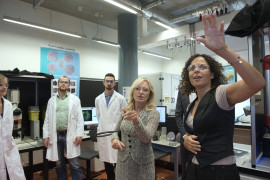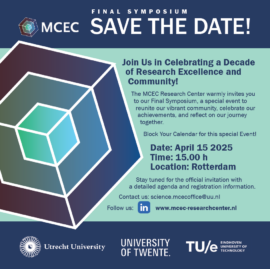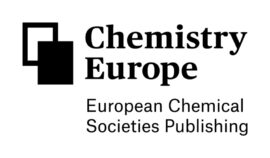News
Minister Bussemaker bezoekt MCEC en de Utrechtse zwaartekrachtprogramma’s
Jonge Utrechtse wetenschappers vertelden afgelopen maandag (31 augustus) persoonlijk aan minister Jet Bussemaker van Onderwijs, Cultuur en Wetenschap over hun werk binnen de Zwaartekrachtprogramma’s.

bezoek minister Bussemaker UU 31 aug 2015
Fotografie Jeannette Schols
Minister Bussemaker en rector Bert van der Zwaan (Universiteit Utrecht) kregen een rondleiding door de anorganische chemie-laboratoria van het Netherlands Center for Multiscale Catalytic Energy Conversion (MCEC). In deze laboratoria werken onderzoekers aan heterogene katalyse.
Hier wordt onderzoek gedaan op verschillende schalen, van meters tot nanometers. De minister kreeg bijvoorbeeld de mogelijkheid om met een fluorescentiemicroscoop te kijken naar katalysatordeeltjes, die enkele nanometers groot zijn. Een aantal jonge onderzoekers binnen het MCEC-programma presenteerde hun onderzoek aan de minister.
Bert Weckhuysen over Zwaartekracht: “De Zwaartekrachtprogramma’s katalyseren multidisciplinair onderzoek. Behalve doorbraakonderzoek richten we ons ook op outreach, valorisatie en het opleiden van jonge onderzoekers. We zien het als onze plicht om een nieuwe generatie topwetenschappers op te leiden. Meer specifiek, MCEC richt zich op energietransitie: het ontwikkelen en verbeteren van nieuwe vormen van energie: duurzaam, milieubewust en minder afhankelijk van fossiele brandstof. Behalve nieuwe brandstof is er ook winst te behalen in het gebruik van fossiele branstoffen. We doen onderzoek naar activiteit, selectiviteit en stabiliteit van katalysatoren. De vakgebieden fysica, chemie en materiaalengineering zijn hierbij betrokken.”
Minister Bussemaker: “Het is goed om te horen dat hier zoveel wordt samengewerkt, zowel binnen de Universiteit Utrecht als met andere universiteiten. Het doet me goed om te horen dat er veel aandacht wordt besteed aan jonge onderzoekers en vrouwelijke onderzoekers. Ik vind het belangrijk dat de focus niet alleen gelegd wordt op het ophalen van kennis, zoals dit jaar met de Nationale Wetenschapsagenda, maar ook het delen ervan.”
Zwaartekrachtprogramma’s
De Zwaartekrachtprogramma’s zijn samenwerkingsverbanden tussen toponderzoekers in Nederland, gericht op breed, multidisciplinair onderzoek. De Universiteit Utrecht is penvoerder van vier Zwaartekrachtprogramma’s: Netherlands Center for Multiscale Catalytic Energy Conversion, Netherlands Earth System Science Centre, Cancer Genomics Centre Netherlands en Consortium on Individual Development.
Twente Labtour
The second Labtour on the 20th of August at University Twente was a good opportunity to see how meetings and lab visits can create a common exchange of knowledge from the point of view of physicists, chemists and engineers.
Prof. Albert van den Berg gave a short introduction on the project cluster Nanoreactors and an insight in how certain techniques can make experiments running cheaper and more exact. Prof. Detlef Lohse did the same on the project clusters Nanobubbles and Fluidic Systems and explained more about the Ouzo effect.
Two individual projects were presented by Alvaro Moreno Soto and Edwin Dollekamp in the lecture hall as well as during the labtour on site, along with other research subjects and facilities. For example the 8m tall bubble column and why research on detaching bubbles from surface is relevant for catalysis; a high pressure nano reactor; several lab-on-a-chip projects; and how research is done on relevant applications like decreasing the fuel consumption of ships with several % by using a bubble bed under the hulk.
Veni grant for Jovana Zecevic
Dr. Jovana Zecevic is awarded a personal Veni grant by NWO. Jovana received the grant for her research entitled ´ Real-time studies at the nanoscale of the liquid-phase synthesis of zeolite-based catalysts´.
Prof. Detlef Lohse appointed as External Member of the Max Planck Institute for Dynamics und Self-Organisation
Professor Dr. Detlef Lohse was appointed as External Member of the Göttingen Max Planck Institute for Dynamics and Self-Organisation at the 66th Annual Meeting of the Max Planck Society in Berlin on 17th-18th June. At the same time he was appointed as Member of the Max Planck Society (MPG).
3-D scans of single atoms show why catalyst loses power
Aluminium lumps sabotage ‘assembly line’ in catalyst
An international team of researchers, among which prof.dr.ir. Bert Weckhuysen, was the first to make a detailed 3-D scan of individual aluminium atoms in a zeolite crystal.
Tenure Track Faculty Position Assistant professor
This assistant professor position is vacant in the Inorganic Materials Chemistry group (head of group prof. Emiel Hensen) of the department of Chemical Engineering and Chemistry at Eindhoven University of Technology.
The aim of this new faculty position is to initiate a new research direction in computational chemistry of heterogeneous catalysis with an emphasis on the development of novel multiscale modeling approaches for catalysis and materials design. The focus will be on the development and application of mesoscale methods that bridge the gap between atomistic electronic structure calculations and macroscopic continuum models to arrive at a complete multiscale description of catalytic reactors. Read more
Prof. Albert van den Berg receives ERC Grant
Albert van den Berg receives the prestigious ERC Advanced Grant for the second time. He will use this grant to cultivate blood vessels on a chip, made from ‘reprogrammed’ human stem cells.
Inspiring MCEC Labtour
The first MCEC Labtour on the 10th of June at Utrecht, with 34 participants, was inspiring. It was a great opportunity for the PhD students to meet and see the possibilities of the lab facilities and to learn about the research lines that the groups Inorganic Chemistry & Catalysis and Soft Condensed Matter are working on.
Dr. Pieter Bruijnincx (Utrecht University) and Dr. Niels Deen (Eindhoven University of Technology) presented the projects on the topic Biomass. The projects of the topic Future Methodologies in Catalysis & Solar Fuels was presented by Prof. Alfons van Blaaderen, Dr. Monica Barroso, Dr. Celso de Mello-Donega and Robin Geitenbeek (MSc) (Utrecht University). The presentation was followed by a labtour on site and it inspired the discussions during the reception.
New MCEC members at Twente
At the University of Twente there are three new MCEC members appointed in a staff position. Xuehua Zhang en Roberto Verzicco are Part time Professors in the research group Physics of Fluids. Xuehua’s research area is “Colloid and interface science”. Roberto’s research research interest is “Numerical simulation of complex flows and turbulence”. Mathieu Odijk is appointed on a Tenure Track Assistant Professor position on “Micro- and Nanodevices for Chemical Analysis” within the MESA+ institute for Nanotechnology.
Read more about their work and research interest.

















